#it doesn't spoon-feed you. it doesn't cave to over-explanation
Explore tagged Tumblr posts
Text
Nuance, Narratives, and Nosferatu
As of today, Robert Eggers' Nosferatu (2024) has only been in theatres for 4 full days; and, coincidentally, that is about as long as I am able to let my thoughts marinate before they demand to be communicated. Before going into any further detail, let it be known that this film was made by freaks for freaks; it exists for the goths, the gays, the monsterfuckers, the historians, and for all those who delight in moral and thematic complexity.
With that being said - spoilers under the cut!
There are two principal narratives running through the flesh of Nosferatu, both of them rooted heavily in the cultural and literary origins of the story. It is a nightmare; it is also an erotic fantasy. It is horrifying, and it is also achingly romantic. From what I've seen so far, the vast majority of discourse that has already emerged around the film is caused by people misunderstanding or deliberately ignoring the relationship between these different lines of analysis; so please trust me when I say, from the bottom of my heart, that this duality is the very lifeblood of the movie.
The reason for that is, quite simply, that Nosferatu is a gothic horror film, set in 1830s German Confederation; and its plot relies on the same (sometimes contradictory) complexities often displayed in Victorian gothic fiction.
From the beginning of the movie, we are given to understand that Ellen Hutter met Count Orlok - the eponymous nosferatu - psychically, when she was very young. They spoke, she pledged herself to him, and was horrified to realize what she had done when he revealed his true visage to her in their first visual (and sexual) encounter.
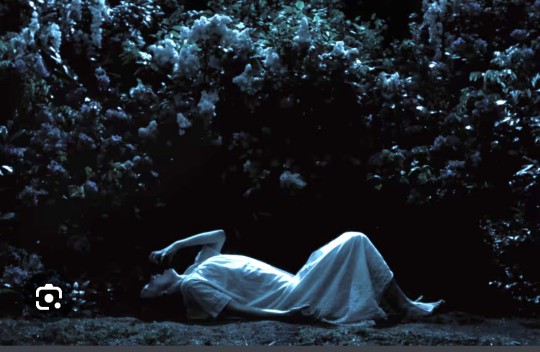
Here, under the lilacs, the paths diverge.
The first reading of the film is perhaps the more straightforward. A young girl is essentially catfished and groomed by a much older, dangerous man. When they meet for the first time, she is a teenager; the lilacs that bloom where it happens become a trigger. He is the source of her madness and "melancholy" (depression), she has nightmares about him regularly enough that her husband is aware of them, and it is implied that she has been institutionalized in the past. Thomas Hutter is the physical representation of her one desperate hope for a normal life - but as the story progresses, she finds herself being denied even that. Orlok's psychic connection with her verges on demonic possession; in chilling, The Exorcist-inspired sequences, she writhes and mutters, prophesying a city-wide reign of death and terror. In pursuit of his claim on Ellen, Orlok terrorizes her husband, murders her friends - and, eventually, she gives her life to take him with her to the grave, saving the city from the plague he caused.
That is the horror element of Nosferatu; it deals with an exploration of childhood trauma, of PTSD, of difficulties maintaining a social life after the fact. It is easy to understand even from a modern viewpoint, and it pushes the film to its conclusion with a bleak, heart-wrenching punch.
The horror is not the only element of Nosferatu.
To contextualize the alternate - though just as correct - reading of the film, it is essential to understand that Ellen’s society was extremely sexually repressed, especially in regards to female and queer sexuality.
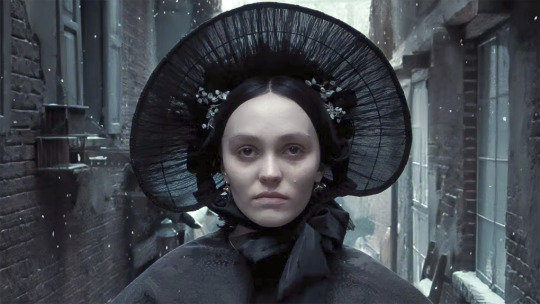
Both were severely medicalized, demonized, and restricted; and as such, when these topics do make an appearance in contemporary fiction, they are often inextricable from disgust and fear.
Dedicated as always to historical accuracy, Eggers maintains the same setting-based narrative coding.
In anticipation of morality arguments vis à vis monstrosity, depiction, and modern purity culture, let me clarify: this is something that works within his chosen genre. Horror, and especially gothic horror, invites a deeper analysis in regard to morality and motivation, and in this case, Eggers' homage to the origins of that genre grounds the narrative in its time and location, as well as fleshing it out much further than a purely modern cultural lens would permit. In this context, the details of Ellen's connection with Orlok become paramount to the understanding of the film.
As bits and pieces of their background become revealed, the audience realizes that her psychic gift did not begin with him - and neither did her melancholy, or her isolation. She was born with her abilities, and throughout her childhood, she was a bit of a tomboy by her contemporary standards, running wild in the woods near her father's property; however, once she foretold her mother's death, and once she was too old to get away with eccentricities, her father became frightened of her abnormality. She was isolated, confined indoors, and that is when her melancholy had begun. Painfully lonely and aching for some form of companionship, she called out into the ether; and Orlok responded.
Over the course of their story, he becomes the physical manifestation of everything Ellen perceives as dark and sinful about herself.
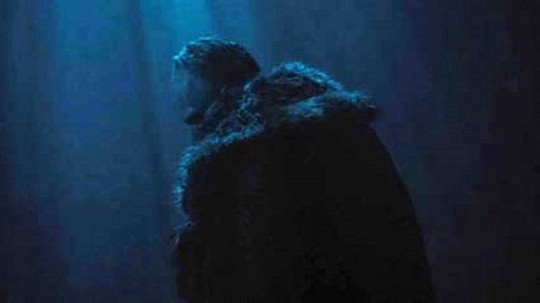
He is psychic, he is vicious, possessive, and blatantly sexual; her sensual affection with Anna parallels the evident and physical attraction he displays towards Thomas; and the social power he so easily commands is the same that she lacks, being a woman in a rigidly patriarchal society.
In the end, the severely questionable age gap, the murders, the coercion, the betrayal - all of that comes down to respect. Throughout the film, that is the one thing that Ellen is consistently denied. She is young when she meets Orlok, yes; but she is aggressively infantilized by her surrounding society even when she is a grown, adult, married woman.
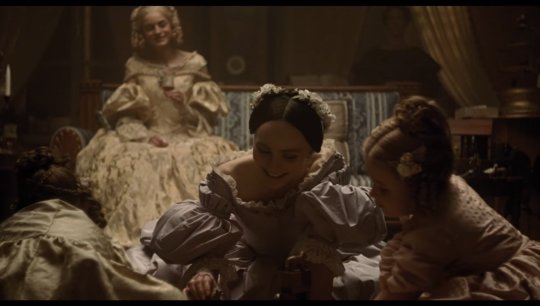
It starts from the beginning of the film, when the Hutters visit the Harding family. During those scenes, the men are shown talking business - while the women play with children in the parlour; and the same social framing persists into the body of the film. When Ellen is suffering from what appears to be some form of mental illness, she is referred to as a child by multiple different characters; and when the condition progresses, she is swiftly diagnosed with hysteria and drugged - thus being forcibly removed from the discussion of her own illness. The general reactions to that illness - which is, in fact, a display of her psychic abilities - range from annoyance to fear to curiosity; it is seen either as a disability or a curse, rather than anything entirely innate to who she is. Her fears are dismissed. Harding tells her to learn some deference. Even closer to the finale, when Von Franz admits that she could have been a great priestess in another age, he does so with pity rather than anything else; in their industrial era, he cannot help but see her only as a tragic sacrifice - horrible, but necessary to save the city from a plague. Brought in to heal her, he instead guides her to her death.
All these aspects of Ellen's circumstances find a direct opposite in her relationship with Orlok. Unlike all other characters in the film, he only ever sees her as his equal, which is made even more evident when his interactions with Thomas and Herr Knock are brought into consideration. With both men, Orlok insists on being addressed by his lordly title, "as his blood demands it"; and yet, Ellen never calls him by any title at all, be it "My Lord" or even a simple "Herr." She argues with him freely, and there is a familiarity between them that he is demonstrated to never tolerate from anyone else. Similarly, while he disguises the covenant he makes with Thomas, the terms of his covenant with Ellen are laid out clearly, in full. He does not hide from her; she already knows the worst of him, the same way he knows that she is intelligent, that she is powerful, and that she is not meant to be demure and deferring. Again and again, Orlok insists that Ellen is not meant for humanity - and the true horror, the horror she cannot bring herself to face, is that he is right.
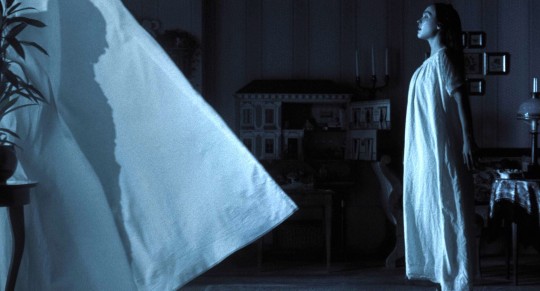
In a sense, he is a mirror held up in front of her own face. Ellen is painfully aware that she does not fit in, and that she never has. The "normal" society, epitomized by the Hardings (wealthy husband, pretty blonde wife, 2.5 kids), has no place for her - and actively dislikes her.
The film makes this ostracism impossible for the viewer to ignore. As the story progresses, it becomes evident that the other human characters - even those that do sincerely care for Ellen - never truly know her. Anna loves her, but wishes she would not talk of dreadful things - and lashes out as a result of that discomfort, scolding her. Sievers finds himself bewildered by her; Knock sees her as an object to trade; Von Franz pities her, Harding hates her, and Thomas cannot truly satisfy her, even after being touched by the supernatural himself.
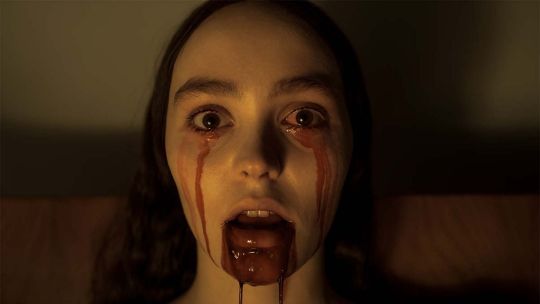
Seeing a flash of a monstrous face while they are together, he flings her away. To him, his experience with Orlok is merely traumatic, and he wishes for nothing more than to leave it behind. However, to her, it is something she cannot help but crave; and she continues to wear her lilac perfume.*
All that to say - Count Orlok is, simultaneously, everything Ellen wants and everything she is terrified of being.
That specific dichotomy reaches its climax during their mutual finale. As it is to be expected from a vampire wedding night, they rejoin in a sequence of sex, blood, and renewed vows - and what is particularly notable is that (unlike Murnau) Eggers makes it clear that this Orlok never intended to kill his Ellen, despite his inability to resist her blood. Though he drinks from her through the night, he stops at cock-crow; and she guides his head back down herself, distracting him long enough for the sun to rise. It is a duet of accident and intention. He drains her; and she holds him as the sun drains him. They cling together as they end - on a bed that serves their wedding and their death.
It is romantic. it is unquestionably romantic. However, that does not mean that the horror isn't also present; Ellen's consent, under these circumstances, is highly debatable, and Orlok is cruel, amoral, and murderously possessive. At the same time, the characters are also acting out folkloric archetypes, with precious little adjustment to that framework - which further removes them from a modern understanding of morality. He is Death, a Koschei the Deathless, a monster; she is the Maiden, a Vasilisa, a damsel. I hesitate to liken them to the Beauty and the Beast, largely because in the original premise of that story, the Beauty falls in love with the kindness that the Beast consistently displays; and it is essential to stress that Orlok has none. He does care for Ellen, in his own way, but he admits to being incapable of love as she defines it in human terms;** and, curiously, that seems to be her primary concern when it comes to the idea of accepting his proposal - rather than all the blood and carnage.
What I'm trying to say, I suppose, is that there are multiple ways of following a story, and multiple different stories in a film as nuanced as Nosferatu. Yes, it is about grooming and trauma. Yes, it is about finding love outside of the cage that is "polite society." I'm sure that it is many other things besides, with as many meanings as there are people in the theatres; after all, I am only one person, and the film grossed something over $40M in its first three days. The point is, really, that this is a story in which a rotting vampire is woken from centuries of deathlike slumber by a lonely voice asking him to be her friend; and whatever these two strange and aching souls do with that can go down any myriad of paths. The film trusts the viewer to interpret the narrative they choose.
* LILAC PERFUME - in fact, it is such a consistent favourite of Ellen's that Orlok smells it on her hair in the locket she sends with Thomas to the castle. Thomas never really learns the reason she likes that scent - even though he knows that preference well enough that he gifts her lilacs in the beginning of the film.
** ORLOK'S OBSESSION - this is a side note, but: the vampire wedding sequence reminds me strongly of the third season of NBC's Hannibal. I suppose that was to be expected, considering that Hannibal is also a Dracula offshoot, much like Orlok himself. When Ellen snaps at Orlok that he cannot love, he responds that "no; but only with you, I can be truly sated." Similarly - "Is Hannibal in love with me?" asks Will; and Bedelia responds - "Could he feel a daily stab of hunger for you, and find nourishment at the very sight of you?" I'd say if you liked that series, you should try and see the film. It works with a familiar blend of aesthetic horror.
#nosferatu#nosferatu 2024#robert eggers#lily rose depp#bill skarsgård#nicholas hoult#nosferatu spoilers#nosferatu analysis#nosferatu movie#willem dafoe#nosferatu meta#gothic horror#horror#horror film analysis#this movie respects its audience's intelligence#and that is everything to me#it doesn't spoon-feed you. it doesn't cave to over-explanation#it allows you to do the analysis yourself and read into the details#everyone say thank you robert eggers
1K notes
·
View notes
Text
y'know what fuck it, here's an (incomplete) list of things that could be resolved with a totk dlc or just general things i didn't enjoy in the story:
1) after the princess sightings quest, penn is left distraught and i feel his story could be continued in dlc
2) why is tulin a sage? all the other sages are who you adventured with in botw except for tulin in exchange of teba. why?
3) where the fuck is all the shekiah tech? i get that they dismantled it after the calamity because most of hyrule was not ready to trust it again, i get that, that makes sense. where did it go? those divine beasts were fucking huge, surely at least their remnants would be scattered in desolate parts of hyrule? literally the foundation of the castle was shekiah tech, ganon's chamber was a giant shekiah room.
4) one of my biggest complaints, where is more champion mentions? if you lived under a rock and had no clue who the champions were before playing totk, you would've had no clue why it was called revali's landing. mipha got her statue moved and a few mentions but that was obligatory because she still has living relatives. daruk has his face carved on the mountain but i think that was about it. and tbh i don't remember a whole lot of urbosa mentions but idk it's been a hot minute. i get their spirits moved on, but come on give us something
5) the memory remembering format worked well for botw because it was your own memories, but it doesn't make as much sense in totk with the dragons tears. tbh it just kinda felt like a way to spoon-feed the player plot
6) [MAJOR SPOILER] why the fuck did zelda get turned back to normal in the end? i get that it makes for a nice happy ending, but it made absolutely zero sense. dragonification was supposed to be irreversible yet she was brought back pretty easily with absolutely no explanation
7) piggybacking off the last one, why did link get his arm back? i get rauru taking his arm back in the end, his spirit is moving on whatever, but why did link get a fully healed arm back? his arm was so badly decayed it would've have killed him before, so surely it would've been cut off back there. why wasn't he just an amputee at the end of the story? again no explanation for rauru and sonia's general powers
8) more plot for the sages back in the past. they felt like empty vessels. the champions got so much fucking plot in botw while still telling the story of their descendents. it really shouldn't have been so hard to make up some story for those sages.
9) why didn't mineru talk the moment you got the purah pad? she was stored away in there so why she only decide to talk as soon you got to where she wanted you to be?
10) why is the landscape so different from botw? the depths, the caves, the sky islands, all brand new, how did it get there? maybe i just missed something in my playthrough but i don't remember a real clear cut answer for that. i get that most of it can be chalked up to the upheaval messing with the terrain or whatever (which is a shit explanation btw) but like the caves? how do you explain those? is it like an alternate timeline like age of calamity? did the upheaval cause like a split timeline or something? idk man.
i know im forgetting shit i want to complain about but i have the memory of a goldfish so this is my list for now, might add more later idk. this is what happens when you prioritize gameplay over story. yeah cool we can make a car, i however, care about the lore. didn't aonuma literally say something like he didn't give a shit about the overall timeline?? that is not the man who should be leading the project im sorry
the fact that there's not going to be any totk dlc specifically because they 'feel like they've done all that they can with this world' or whatever is so fucking stupid. im sorry, i really did enjoy totk but the story is half baked at best, whether it's the main line story, or side character's stories, or even the game's place in the overall timeline, the nicest possible descriptor for all of it is half baked. botw was absolutely fantastic, especially in it's story. everything really felt tied up nice and neat. but totk was developed with gameplay first and story second and it fucking shows. and dlc is literally the perfect opportunity to fix that. i could start listing off all the plot holes or loose ends that could be tied up in totk dlc but it would just genuinely be too long a list. i love totk, but now that the initial release hype has settled, it's extremely clear that botw was the better game. don't make a sequel to perfection just to explore more gameplay mechanics. you actually need a story to go along with those mechanics. and it especially sucks because there was so many cool things they could've done with the story. age of calamity explored some of those elements wonderfully but the hyrule warriors format is not the way i wanted to explore this iteration of hyrule.
2 notes
·
View notes